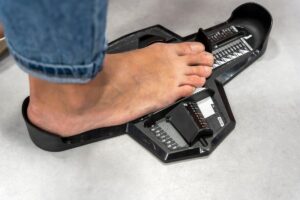Many individuals face daily challenges associated with having wide feet, but discovering the perfect footwear can be a seamless journey. Common issues such as discomfort, blisters, and a limited selection of shoes often arise. However, by understanding the specific needs of your feet, you can significantly enhance your overall experience. Wearing poorly fitting shoes can result in serious foot problems, including bunions and chronic pain. Recognizing that wide feet are a normal variation is the first step toward achieving comfort, and choosing the right footwear can help avert long-term health issues. This extensive guide aims to enrich your understanding of wide feet while helping you find shoes that effortlessly blend comfort and style.
Explore the Distinct Characteristics of Wide Feet for Informed Footwear Selections
Gaining a deep understanding of your wide feet is essential for making informed decisions when it comes to selecting the right footwear. Research indicates that nearly 30% of adults have feet wider than standard shoe sizes. Various factors, including genetics, age, and lifestyle, play significant roles in determining foot width. By recognizing these influences, you can make educated choices about shoes that cater to your unique foot shape and specific needs, ensuring a superior fit and enhanced comfort.
Appreciate the Natural Variation in Foot Structure for Optimal Fit
The width of your feet varies naturally, similar to height and body shape. Your genetic background is a key factor in shaping your foot structure. If you have inherited wide feet from your family, remember that this is a common characteristic rather than a health issue. Understanding these genetic influences can help you embrace your unique foot attributes, enabling you to make more informed decisions when choosing footwear that accommodates your specific requirements.
Recognize the Evolution of Foot Width Throughout Your Life
Various life stages can lead to changes in foot width over time. Pregnancy can increase foot width by as much as one full size, and as individuals age or experience weight fluctuations, they may observe alterations in foot size. Additionally, factors such as prolonged standing or certain medical conditions can contribute to the widening of feet. Acknowledging and adapting to these changes is crucial for selecting the right footwear.
It’s advisable to measure your feet regularly, as they can change size every few years. Fluctuations in weight, aging, and physical activity all contribute to these variations. Failing to adjust your footwear to fit these changes can lead to significant foot issues, such as bunions, corns, and persistent discomfort. Awareness and proactive strategies will aid in maintaining foot health and comfort.
Investigate the Major Factors Leading to Wide Feet
Understanding the elements that contribute to your wider-than-average feet is vital for finding suitable footwear. Several factors can lead to wide feet, including genetics, medical conditions, and lifestyle choices. By identifying these factors, you can pinpoint tailored solutions that cater to your individual needs and preferences.
Delve into the Genetic Factors Influencing Your Foot Width
Your family history and inherited foot structure play a crucial role in determining your foot width from birth. Traits such as bone structure and arch type are inherited and can have a significant impact on how your feet develop. By educating yourself about these inherited attributes, you can gain valuable insights into your foot’s distinct shape and the most suitable footwear options for you.
Recognize Medical Conditions That May Contribute to Foot Width Changes
At times, underlying health issues may lead to the widening of your feet. Common medical conditions, including diabetes, arthritis, and edema, can alter both the shape and size of your feet. Monitoring how these conditions influence your foot width can be crucial for maintaining comfort and health.
The effects may be temporary or permanent. For instance, your feet might swell during pregnancy, after an injury, or due to circulatory issues. Regular check-ups with your healthcare provider can help you track any changes and address potential issues proactively.
Evaluate Lifestyle Factors That Influence Your Foot Width
Experts agree that your daily activities can significantly shape your foot width. Extended periods of standing, excessive body weight, and improper footwear can all contribute to the gradual widening of your feet over time.
Your lifestyle, combined with genetic and environmental factors, ultimately determines your foot width. High-impact activities and poor shoe choices can accelerate this change. The nature of your work and daily habits will play a vital role in your overall foot health and shape.

Learn About the Health Risks Linked to Wide Feet
When not properly accommodated, wide feet can lead to serious health complications. The width of your feet affects the alignment of your entire body and can influence your joints, posture, and overall mobility. Studies reveal that an astonishing 72% of individuals do not wear shoes that fit correctly, resulting in preventable foot ailments.
Understand the Physical Consequences of Having Wide Feet
Approximately 65% of people with untreated wide feet suffer from chronic foot pain. When your foot lacks proper support, your body compensates by altering your walking pattern, leading to knee pain, hip discomfort, and lower back issues. Over time, these compensatory changes can result in long-term joint problems if appropriate footwear is not utilized.
Overcome Daily Discomfort Challenges Due to Ill-Fitting Shoes
When your shoes do not accommodate your wide feet, everyday activities can become challenging. You may experience immediate discomfort, blisters, and pressure points that impede your ability to move freely. Research indicates that 80% of individuals with wide feet report reduced activity levels as a result of foot pain.
The repercussions of wearing unsuitable shoes extend beyond temporary discomfort. Your feet may develop painful conditions, such as bunions, corns, and calluses, negatively impacting your balance and stability, making you more vulnerable to falls and injuries. Selecting the right footwear is essential for preserving your foot health and overall quality of life.
Discover Effective Footwear Solutions Customized for Wide Feet
Finding suitable shoes is crucial for individuals with wide feet, ensuring both comfort and the promotion of foot health. Your footwear should provide ample space while offering the necessary support and stability for your daily activities.
Recognize the Significance of Accurate Measurements for Optimal Shoe Fitting
Precise foot measurements are vital in selecting shoes that fit correctly. Measure your feet at the end of the day when they are at their largest, and ensure to measure both feet, as sizes may vary.
Identify the Most Suitable Shoe Styles for Wide Feet Accommodation
Certain styles of shoes are inherently better suited for wide feet than others.
| Feature | Benefit |
|---|---|
| Wide toe box | Allows natural toe spreading |
| Adjustable closures | Customizable fit for comfort |
| Breathable materials | Helps reduce swelling |
| Deep heel cup | Provides enhanced stability |
| Flexible sole | Adapts to foot shape for comfort |
- Athletic shoes featuring breathable mesh uppers
- Sandals with adjustable straps for a personalized fit
- Loafers offered in wide widths for extra comfort
- Boots designed with elastic panels to accommodate wider feet
For example, specific shoe designs can significantly enhance your comfort levels.
| Shoe Type | Best Features |
|---|---|
| Running shoes | Extra width options for improved fit |
| Walking shoes | Roomy toe area to prevent cramping |
| Casual shoes | Stretchable materials for flexibility |
| Dress shoes | Multiple width options to cater to various needs |
| Work boots | Wide-fit designs for comfort during long hours |
Implement Smart Shopping Strategies to Find Ideal Footwear for Wide Feet
Your success in discovering comfortable shoes for wide feet hinges on careful planning and informed choices. Seek out specialty stores that offer wide-width options and employ knowledgeable staff to assist you with proper measurements. It is advisable to shop during the afternoon when your feet are naturally at their widest to ensure an optimal fit.
Choosing the Right Brands for Reliable Wide Feet Footwear
When on the hunt for suitable footwear, focus on brands known for their wide-width offerings, such as New Balance, Brooks, and ASICS. These brands create shoes with additional space in the toe box and midfoot area, resulting in increased comfort for individuals with wide feet. Emphasizing quality construction and adequate support is crucial for your long-term comfort and satisfaction.

Expert Techniques for Securing the Ideal Fit
Successful shoe purchases are rooted in effective fitting strategies. Follow these essential guidelines:
- Measure both feet while standing for an accurate measurement
- Ensure thumb-width space at the toe area for comfort
- Try shoes on with your regular socks to simulate normal wear
- Test the shoes by walking around to evaluate comfort
- Shop during the late afternoon when feet tend to swell slightly
Experiencing immediate comfort is crucial for making the right choice.
Fitting procedures require attention to detail and patience. Consider these additional factors:
- Check for adequate arch support to enhance overall comfort
- Ensure no pressure points that could lead to discomfort
- Verify heel stability for a proper fit
- Test flexibility at the ball of the foot to ensure ease of movement
- Explore various lacing techniques to improve fit
Noticing these details will guide you in finding the perfect fit for your wide feet.
Implement Comprehensive Maintenance and Care for Your Footwear
Proper care for your wide feet requires regular attention to promote foot health and extend the life of your shoes. Incorporate thorough cleaning and drying of both shoes and feet into your daily routine to prevent issues such as fungal infections and unpleasant odors. Consistent upkeep can reduce foot pain by as much as 40% and prolong the life of your footwear.
Daily Practices to Foster Optimal Foot Health
Adopting beneficial habits for your wide feet includes rotating between different pairs of shoes to allow for adequate drying time and minimize excessive wear. After each use, wipe your shoes clean and consider using shoe trees to maintain their shape. These straightforward yet effective steps can extend the lifespan of your shoes by up to 2 years while providing better support for your feet.
Long-Term Prevention Strategies for Sustaining Foot Health
Ongoing care for your wide feet requires consistent attention to prevent future complications. You should replace your shoes every 400-500 miles of walking or whenever you notice significant signs of wear. Regular foot measurements are also essential since your foot width can change over time.
While maintaining your footwear, prioritize foot exercises and stretches. Engaging in regular foot exercises can enhance flexibility by up to 30% and alleviate discomfort. Ensure your feet receive adequate circulation by avoiding prolonged sitting, and consider using compression socks if your lifestyle requires standing for long periods.
Your journey to find the ideal footwear for wide feet can be simplified with the right knowledge. By understanding your foot width, selecting brands that cater to wider sizes, and employing effective measurement techniques, you can make better-informed shoe selections. Your comfort is paramount, so take the time to try on various shoes to ensure they provide ample space for your feet. Following these tips and being mindful of how your shoes fit will lead you to footwear that supports your daily activities while keeping your feet healthy and pain-free.
Answering Common Inquiries About Wide Feet
What is the best way to measure my feet for suitable wide-width shoes?
Stand on a piece of paper while wearing your regular socks. Trace both feet and measure their length and width at the widest points. It’s best to do this in the evening when your feet are at their largest. Compare these measurements to standard shoe size charts and select shoes that correspond to the measurements of your larger foot. Always test new shoes by walking around in them for several minutes to assess comfort.
Which shoe features should individuals with wide feet prioritize for optimal comfort?
Seek out shoes that feature a wide toe box, allowing your toes to spread naturally. Look for shoes labeled with “W” for wide or “EE” width. Opt for materials such as soft leather or mesh that stretch and adapt to the shape of your feet. Choose shoes with adjustable features, like laces or straps, and avoid pointed toe designs in favor of rounded or square toe shapes.
How can I prevent foot problems stemming from incorrect shoe sizes?
Replace any shoes that show significant wear. Purchase shoes from brands that specialize in wide-width options. Ensure your toes have enough space to move comfortably. Consider using shoe inserts for additional support if needed, and alternate between different pairs of shoes daily. Check your foot size annually, as feet can change over time, and discontinue using shoes that cause pain or discomfort.
The Article The Ultimate Wide Feet Guide: Concerns, Footwear Tips, and More appeared first on My Shoes Finder
The Article Wide Feet Guide: Essential Tips and Footwear Solutions Was Found On https://limitsofstrategy.com

Your insights on the challenges faced by individuals with wide feet resonate deeply with my own experiences. I’ve spent years navigating the often frustrating landscape of footwear options, often feeling that the choices available simply don’t accommodate my feet’s unique shape. The discomfort, blisters, and sometimes abrasions from shoes that are even slightly too narrow can truly turn a day out into a grueling ordeal.
Your experience highlights a struggle many of us face, and it’s refreshing to hear someone express it so openly. Finding shoes that fit well when you have wide feet can feel like a treasure hunt where all the treasures are just too small. The discomfort and injuries you’ve described are all too common. I’ve spoken to countless people who have had to forgo stylish options simply because they couldn’t find a decent fit.